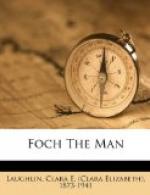He learned to ride, as a matter of course, when he was very young. And all his life he has been an ardent and intrepid horseman.
A community devoted to the raising of fine saddle horses is all but certain to be a community devotedly fond of horse racing.
Love of racing is almost a universal trait in France; and in Tarbes it was a feature of the town life in which business went hand-in-hand with pleasure.
In an old French book published before Ferdinand Foch was born, I have found the following description of the crowds which flocked into Tarbes on the days of the horse markets and races:
“On these days all the streets and public squares are flooded with streams of curious people come from all corners of the Pyrenees and exhibiting in their infinite variety of type and costume all the races of the southern provinces and the mountains.
“There one sees the folk of Provence, irascible, hot-headed, of vigorous proportions and lusty voice, passionately declaiming about something or other, in the midst of small groups of listeners.
“There are men of the Basque province—small, muscular and proud, agile of movement and with bodies beautifully trained; plain of speech and childlike in deed.
“There are the men of the Bearnais, mostly from towns of size and circumstance—educated men, of self-command, tempering the southern warmth which burns in their eyes by the calm intelligence born of experience in life and also by a natural languor like that of their Spanish neighbors.
“There are the old Catalonians, whose features are of savage strength under the thick brush of white hair falling about their leather-colored faces; the men of Navarre, with braided hair and other evidences of primitiveness—vigorous of build and handsome of feature, but withal a little subnormal in expression.
“Then, in the midst of all these characteristic types, moving about in a pell-mell fashion, making a constantly changing mosaic of vivid hues, there are the inhabitants of the innumerable valleys around Tarbes itself, each of them with its own peculiarities of costume, manners, speech, which make them easily distinguishable one from another.”
It was a remarkable crowd for a little boy to wander in.
If Ferdinand Foch had been destined to be a painter or a writer, the impressions made upon his childish mind by that medley of strange folk might have been passed on to us long ago on brilliant canvas or on glowing page.
[Illustration: Ferdinand Foch (center) as a Schoolboy.]
[Illustration: The School in Tarbes Where Foch Prepared for the Military Academy.]
But that was not the way it served him.
I want you who are interested to comprehend Ferdinand Foch, to think of those old horsefairs and race meets of his Gascony childhood, and the crowds of strange types they brought to Tarbes, when we come to the great days of his life that began in 1914—the days when his comprehension of many types of men, his ability to “get on with” them and harmonize them with one another, meant almost as much to the world as his military genius.




